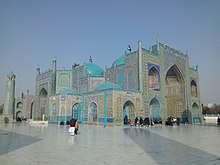Afghan city of Mazar-i-Sharif captured by Taliban
Monday, August 16, 2021

Image: User:Mortazaali787.
On Saturday, the Afghan Taliban captured the Afghan city of Mazar-i-Sharif, giving them control over the nation's fourth-largest city and all of northern Afghanistan, amidst the withdrawal of USA troops from the country, which is scheduled to be complete by the end of August.
Abas Ebrahimzada, a provincial lawmaker, told the Associated Press (AP) the Afghan national army were the first to surrender, leading other pro-government forces to lose morale and concede to the Taliban.
Atta Mohammad Noor, a former governor of Balkh Province and who Reuters called "among the Taliban's fiercest enemies" pinned the capture of Mazar-i-Sharif on a "conspiracy", tweeting "despite our firm resistance, sadly, all the government & the #ANDSF equipments were handed over to the #Taliban as a result of a big organised & cowardly plot", and announcing he was "in a safe place now".
The capture of Mazar-i-Sharif follows the recent fall of both Herat and Kandahar, Afghanistan's second and third largest cities, respectively. According to the AP, the Taliban now controls at least 24 out of 34 provinces in Afghanistan. Hoda Ahmadi, a local lawmaker from Logar Province, has claimed the Taliban had captured all of the Logar Province, and have also taken the Char Asiab District, located in Kabul Province and approximately eleven kilometres south of the Afghan capital Kabul.
A USA official told ABC News on condition of anonymity the USA forces have started flying to Kabul to "help in the evacuation of embassy personnel and other civilians", with USA President Joe Biden authorising the deployment of an extra thousand troops to ensure an "orderly and safe drawdown" of USA and other allied forces in Afghanistan.

Image: Cecilio Ricardo.
Per AP, Mazar-i-Sharif was a former stronghold of the Northern Alliance, who had previously assisted the USA in 2001 in ending the Taliban's rule in Afghanistan. The AP records "makeshift camps" are appearing outside Mazar-i-Sharif, consisting mainly of ethnic Hazaras fleeing their homes.
Salima Mazari, a female district governor of 36 thousand near Mazar-i-Sharif, has said "in the provinces controlled by the Taliban, no women exist there anymore, not even in the cities. They are all imprisoned in their homes", with a women's rights activist from Herat telling the AP Mujeeb Rahman Ansari has been appointed as the Taliban's "women's affairs minister" in the town. The activist, who did not want to be identified, described Ansari as "strongly against women's rights".
Related news
- "US, UK, NATO to withdraw troops from Afghanistan" — Wikinews, April 17, 2021
Sources
- Ahmad Seir, Tameem Akhgar, Rahim Faiez and Joseph Krauss. "Taliban capture key northern city, approach Afghan capital" — Associated Press, August 14, 2021
- "Taliban seizes northern Afghanistan city of Mazar-i-Sharif, military flees for the border" — ABC News (Australia), August 14, 2021
- "Afghan militia leaders Atta Noor, Dostum escape 'conspiracy'" — Reuters, August 14, 2021
- Ata Mohammad Noor. "Ata Mohammad Noor on Twitter" — Twitter, August 14, 2021
- Ata Mohammad Noor. "Ata Mohammad Noor on Twitter" — Twitter, August 14, 2021

